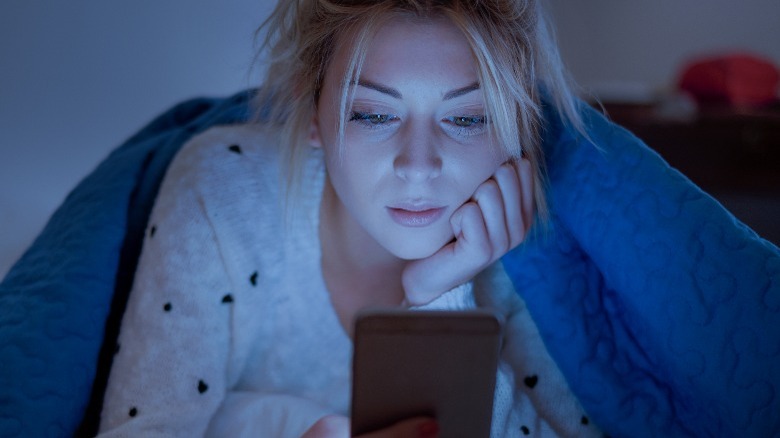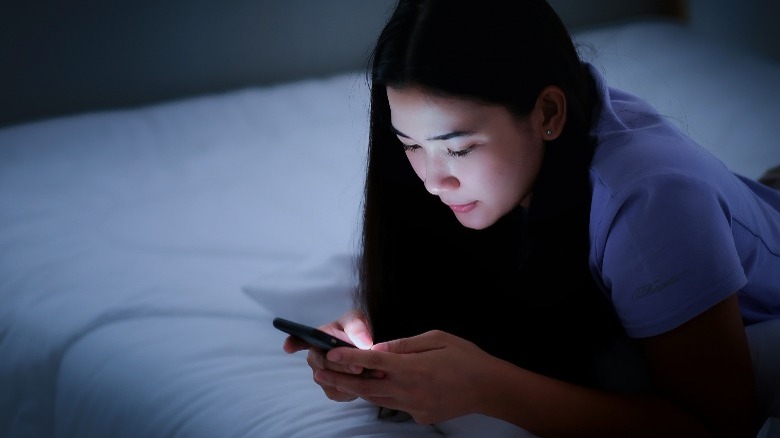What's The Deal With Blue Light-Fighting Skincare Products? Because We're Confused, Too
We may receive a commission on purchases made from links.
Blue-light products can be polarizing — both literally and metaphorically speaking. Perhaps you have heard of blue-light glasses, the controversial product that studies have shown can assist wearers in achieving better sleep. But now, blue-light skincare is gaining traction, and to be frank, we are a bit confused.
First, shall we review what blue light is? Blue light is a short, high-energy wavelength that is weaker than UV light, but not by much. The sun is the main source of blue light, but anything with "LED" in front of it — meaning laptops, cell phones, and televisions — emits blue light, too. Because we spend so much time on our devices, experts are concerned that long-term exposure to blue light from our screens could have a detrimental effect on the health and look of our skin.
Despite a heap of new products on the market meant to address the potential pitfalls of blue light on the skin, are blue-light products actually necessary? And what kinds of claims are companies making that offer blue-light skincare as the next essential product in our regimens?
Blue light, big claims
First, know that dermatologists have used light therapy as a safe treatment for various skin conditions. Blue-light therapy is one such therapy that can actually treat precancerous growths, which is an objectively good thing (per Forefront Dermatology). Blue light can also eliminate bacteria that might cause acne, as well as treat acne scars and inflammation, according to the Cleveland Clinic. And unlike blue-light skincare products for the skin, certain blue-light therapy treatments and devices are FDA-approved. Because blue light has become rather maligned in the discourse surrounding skin health, could cosmetics companies be capitalizing on this perception?
Of course, we cannot know for certain, but this same unknown applies to how blue light is really affecting your skin. Evidence is still growing that, over long exposures, blue light can cause DNA damage and photoaging, per one study by the journal Oxidative Medicine and Cellular Longevity. Another study from the same journal strongly suggests that blue light can cause free radicals in human skin. This is where beauty brands come into play. Clean beauty brand ILIA offers a Blue Light Protect + Set Mist, which claims to "neutralize free radicals caused by blue light" (per ILIA). Neutralizing free radicals, however, does just that; it will not block blue light from reaching the skin, but it could mitigate some of its effects.
Blue light could be both helpful and harmful
The consensus around the effects of blue light on the skin is still to be determined. Research published by the Journal of Cosmetic Dermatology holds that blue light can be both harmful and beneficial for the skin, depending on how long one was exposed to blue light and the level of exposure. Until more information is available, you might choose to explore blue-light skincare as a preventative measure.
Should you want to be cautious about protecting the skin from blue light, look for products that contain iron oxides, which, coupled with zinc oxide, can create an even stronger formula, according to another study in the Journal of Cosmetic Dermatology. Mineral-based sunscreens on the market tend to feature one or both of these ingredients. But brands are now marketing their products specifically toward protecting from blue light. Senté, for example, offers a tinted sunscreen formulated specifically to block blue light, which it claims can color-correct and protect from the light, according to its website. But when all else fails, remember that minimizing your time on your screens — or at least turning down their brightness — is the best protection against prolonged exposure to blue light, when it can be helped.


